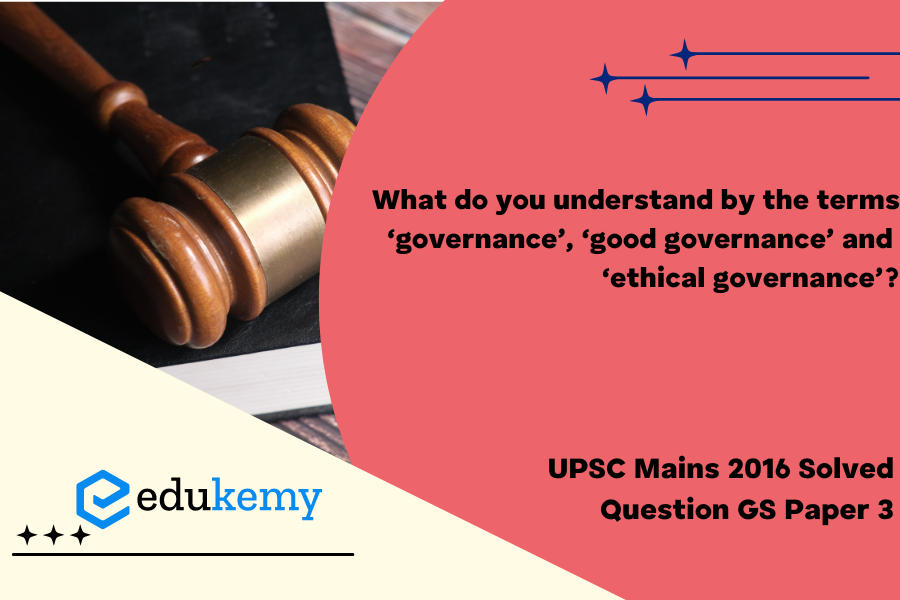Governance, a fundamental concept in the realms of administration and management, refers to the processes and structures through which decisions are made and authority is exercised in organizations or societies. Good governance takes this a step further, emphasizing the principles of transparency, accountability, rule of law, and participation. It embodies the idea that governance should be not only efficient but also ethical, promoting the well-being of all stakeholders and fostering a just and inclusive environment. Ethical governance specifically underscores the importance of moral values and principles in decision-making, ensuring that actions are not only legal and efficient but also guided by a sense of fairness and responsibility. In essence, while governance addresses the mechanics of decision-making, good governance adds a layer of virtues, and ethical governance elevates the discourse by placing ethical considerations at the forefront of administrative practices. These terms collectively form the cornerstone of effective and responsible leadership across various sectors.
Tag: Probity in Governance: Philosophical basis of governance and probity
Contents
Decoding the Question:
- In the Introduction, try to start with the background of governance and how it leads to good governance and ethical governance.
- In Body, explain separately about governance, good governance and ethical governance.
- In Conclusion, try to conclude with Confucius, and Mahatma Gandhi quote on governance.
Answer:
The concept of ‘governance’ is as old as human civilization. Ever since humanity decided to organize itself into political entities, the society within each unit would evolve a system of governance through which its internal affairs and external relations could be regulated so as to afford it the optimum benefit. With time, governance is not enough. Importance of ‘good governance’ and ‘ethical governance’ are coming into the picture.

Concepts of ‘Governance’, ‘Good Governance’ and ‘Ethical Governance’:
- Governance: It is the system of decision-making and the process by which decisions are implemented. Governance entails, as described by the Human Development Report, “the exercise of power or authority in political, economic, administrative spheres to manage a country’s resources and affairs”. Governance also includes the mechanisms, processes and situations through which citizens and groups articulate their interests, exercise their legal rights, meet their obligations and mediate their differences.
- Good Governance: The majority of the member States of the free world today are founded on the principle of “Welfare State”, run with the full participation of the citizens, striving to achieve the common good. This has led to the evolution of “Good Governance”, which is the umbrella concept embraced within a system of governance. Good governance has a few major characteristics. It is participatory, consensus-oriented, accountable, transparent, responsive, effective and efficient, equitable and inclusive and follows the rule of law. It assures that corruption is minimized, the views of minorities are considered and that the voices of the most vulnerable in society are not left unheard in the decision-making process.
- Ethical Governance: Ethical Governance refers to values and ethical behaviour, processes, procedures, culture, ways of doing, and being that ensure high standards of performance, economy, effectiveness, efficiency, quality, and satisfaction. The six perceived ethical governance quality measures are:
- Absence of political instability and violence;
- Voice and accountability;
- The rule of law;
- Reasonableness of the regulatory burden;
- Government effectiveness.
Thus, the importance of ‘Governance’, ‘Good Governance’ and ‘Ethical Governance’ are important parts of Government and administration. Confucius described righteousness as the basis of good governance. The art of good governance lies in making things right and putting them in the right place. This is in conformity with Dharma or righteousness as taught by all religions in the world. He also emphasizes that man himself must become righteous and then only there shall be righteousness in the world. This is comparable with what Mahatma Gandhi said, “Be the change you wish to see in the world”.
In case you still have your doubts, contact us on 9811333901.
For UPSC Prelims Resources, Click here
For Daily Updates and Study Material:
Join our Telegram Channel – Edukemy for IAS
- 1. Learn through Videos – here
- 2. Be Exam Ready by Practicing Daily MCQs – here
- 3. Daily Newsletter – Get all your Current Affairs Covered – here
- 4. Mains Answer Writing Practice – here


